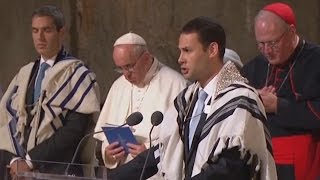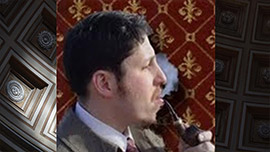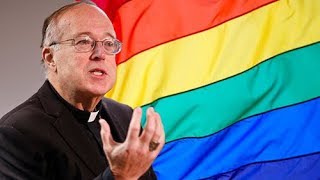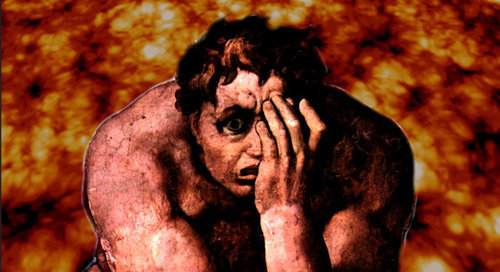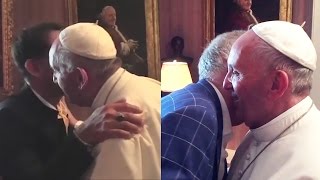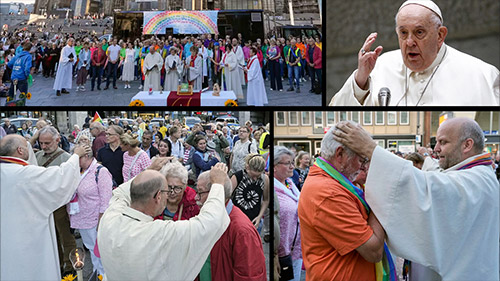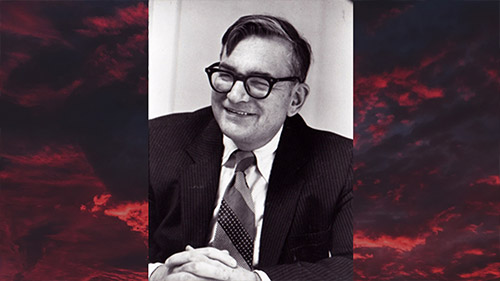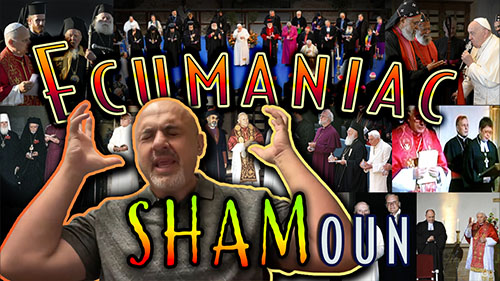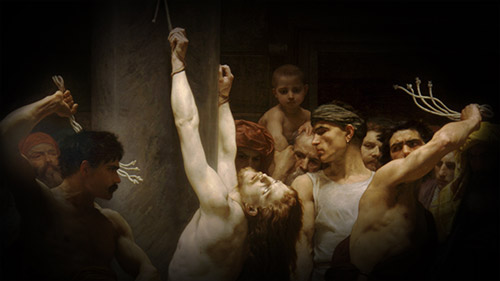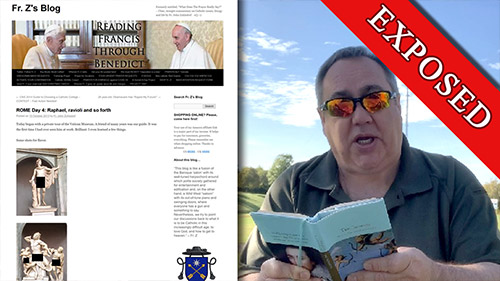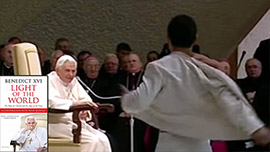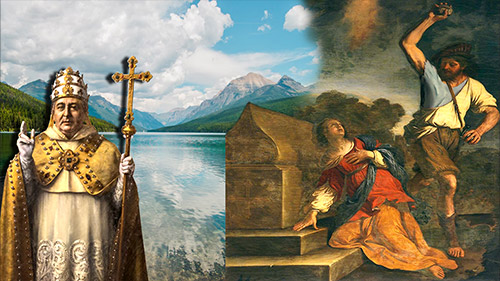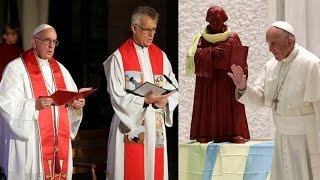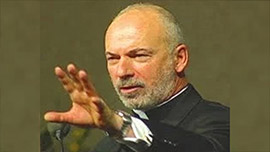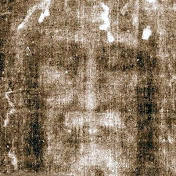 | vaticancatholic.com - English Channel |
Download Audio — File Size: 15.0 MB — Duration: 15:30 Faith & Doctrine | Heresies From The Vatican II Antipopes | The Gates Of Hell Shall Not Prevail | Vatican II Church Is Not Catholic | Where Is The Catholic Church? Bro. Peter Dimond Trent Horn, a member of the Vatican II Sect, recently put out a video in which he tries to respond to some of the points I made in my recent debate on sedevacantism. A number of people have done similar things. Their long videos in this regard are really attempts at damage control because their position was shown to be false by the facts and points covered in the debate. Frankly, their videos are really their attempt to have the debate without me actually being there to respond, to correct them, to refute them, etc., which is what would happen, by the grace of God, in a debate. Suffice it to say, there’s no merit to their responses. We plan to have more comments on this, but in this particular video I want to highlight a heresy and one of the many significant errors that Trent Horn promoted in his attempted response to my debate – that is, his attempt to debate me without me actually being there to respond, refute and correct him. In the debate I pointed out that Vatican II teaches the heresy that Protestants and schismatics who reject the Papacy and other dogmas are inside the Body of Christ. That teaching of Vatican II is indeed contrary to Catholic dogma. That heresy is taught in #3 of Unitatis Redintegratio (Vatican II’s Decree on Ecumenism) and in #15 of Lumen Gentium (Vatican II’s Constitution on the Church), and it’s repeated by many statements of the antipopes.
Now Trent Horn, who thinks that he can explain away almost every heresy or false doctrine promoted by the Vatican II Counter Church – even though he can’t, he fails completely, he actually denies reality – not surprisingly tries to defend this heresy of Vatican II as well. But in the process he makes major mistakes and reveals that he’s ignorant of basic Catholic dogmatic teaching on ecclesiology. He also exposes that he’s unaware of important and relevant aspects of Catholic sacramental theology. Here’s what he says in an attempted response to my point: that Vatican II teaches heresy when it teaches that Protestants and schismatics who reject the Papacy and other dogmas are inside the Body of Christ.
That’s completely wrong, and actually heretical. His fallacious attempt to defend this clear heresy in Vatican II is connected to his error in sacramental theology, as we will see. According to Trent Horn and Vatican II, people who do not profess the Catholic faith in its entirety or preserve communion under the successor of St. Peter are part of the Body of Christ. That’s the opposite of the Catholic Church’s teaching. It’s a dogma that people who reject the Papacy or any dogma of the Church are outside and alien to the Body or Church of Christ, not part of it. Here’s the proof, and in all of these magisterial statements notice the term Body or Church of Christ. That’s what we’re focusing on here.
As we can see, people who do not accept the Papacy are not part of the Body of Christ. That’s the Catholic Church’s teaching. But it’s not the teaching of Vatican II or Trent Horn, because they aren’t Catholic.
Those suffice to prove the point and refute Trent Horn and Vatican II, but there’s more. At the Council of Florence, in the Bull Cantate Domino, Pope Eugene IV solemnly declared:
So, there you have it. Now this principle, solemnly declared by Florence, applies to people who reject any dogma of the Catholic Church. But just in case someone like Trent Horn tries to diminish the force of Florence’s solemn statement here, by claiming that it comes after dogmatic statements about the Trinity, some of which Protestants and the Eastern ‘Orthodox’ would accept, note that it comes after a dogmatic statement about the Filioque. The Eastern ‘Orthodox’ don’t accept the Filioque. Hence, this solemn pronouncement of Florence proves that the Eastern ‘Orthodox’ who reject the Filioque are aliens from the Body of Christ; but that is not the position of Vatican II and Trent Horn. They, on the contrary, heretically teach that the Eastern ‘Orthodox’ are part of the Body of Christ. The falsity of Horn’s position should also be apparent to anyone who knows the Catholic Church’s teaching that all in the Body of Christ have the same faith. That was taught in the bull Unam Sanctam of Pope Boniface VIII and in many other pronouncements.
Thus, people who do not preserve the faith, such as Protestants or the Eastern ‘Orthodox’, are not part of the Body of Christ. Pius XII also taught:
Schism, heresy and apostasy sever a man from the Body of the Church of Christ. Non-Catholics who reject the Papacy or another dogma commit the offense of heresy and are severed from the Church of Christ. But someone like Trent Horn might even deny that Protestants commit heresy when they deny the Papacy or another dogma. After all, Antipope Benedict XVI said that Protestantism is not even heresy. Pope Leo XIII teaches the same truth about the Church in his encyclical Satis Cognitum.
Notice, the Catholic Church teaches that those who depart in even the least way from the Church’s teaching are considered as having no part of Catholic communion and as banished from the Church. That Church is the Body of Christ. What’s very interesting about this text is that in the Latin, Leo XIII uses the word expertem, an accusative form of the adjective expers, which literally means “having no part”.
It was providential that Leo XIII used that word. It directly contradicts, in advance, the heretical teaching of Vatican II and people like Trent Horn: that those who depart from Catholic teaching retain partial communion with the Catholic Church if they are baptized. No, they have no communion with the Church. They are aliens to the Church of Christ. Leo XIII also used the word extorrem, which means ex terra, or having been exiled from a country or a land.
One is not exiled from a country or a land if one has partial movement within it. The prefix ex, which Leo uses in these words, means “out of”, not “partly inside”. There’s more we could quote, but that suffices to refute Trent Horn’s heresy and false argument on this matter. TRENT HORN'S HERESY IS CONNECTED TO HIS ERROR IN SACRAMENTAL THEOLOGY Now Trent Horn’s heresy and false understanding of this matter are, as I mentioned, connected to his false view on what happens when someone is baptized as a heretic. Horn mentions that members of heretical groups can perform or receive a valid baptism, which is true. From that premise he proceeds to conclude falsely that non-Catholics who are validly baptized are necessarily united to Christ and to the Body of Christ by that valid baptism. He argues thus:
But he’s wrong. He’s ignorant of true Catholic teaching on this matter. Someone who is baptized as a heretic (for example, a 30 year-old Protestant who rejects the Papacy) can indeed be validly baptized if proper matter, form, etc. are used, and thus he would receive the baptismal character in that valid baptism. However, he would not receive any grace or union with Christ. He would not become a part of the Church of Christ by that baptism. His heresy is an impediment to the bestowal of the sacramental grace and union with Christ. Trent Horn clearly doesn’t realize this, but it’s the teaching of the Church. You can find it in the teaching of Pope St. Leo the Great, Pope St. Gregory the Great, and others. Speaking of those baptized validly as heretics, Pope St. Gregory the Great states:
As we see, people can be validly baptized as heretics, but they are not cleansed by that baptism or united with Christ until they put away their heresy and embrace the faith of the Church. When the person puts away his heresy and joins the Church, then the effect of the valid baptism which he received as a heretic kicks in. Pope St. Leo the Great taught the same. In Letter 159 he teaches that heretics who are baptized are not sanctified, even though they are validly baptized.
The same is taught by St. Augustine, St. Thomas, and others.
In the previous article St. Thomas mentioned “disbelief” as an example of insincerity that prevents the effect of baptism. The same truth is seen in the Council of Florence, which declares that the reception of sacraments only benefits those inside the Catholic Church.
Hence, a heretic who is validly baptized is not united to Christ when he is validly baptized. We see the same principle in the Council of Trent, which teaches that the sacraments confer grace upon those who do not place an obstacle or impediment in the way. Heresy is an obstacle or impediment to the grace of the sacrament.
The same principle is acknowledged by many theologians. For instance:
That principle of course applies to heretics. Since Trent Horn simply doesn’t understand Catholic teaching on this matter (which is not surprising because he’s not in the Catholic Church but in the Vatican II Sect), he attempts to defend Vatican II’s blatant heresy (that Protestants and others who deny Catholic teaching are part of the Body of Christ) with a completely fallacious argument. He realizes that heretics can receive a valid baptism, which is true. However, since he doesn’t understand that heretics don’t receive grace or union with Christ by that baptism until they remove the obstacle of heresy, he wrongly concludes that they become part of the Church of Christ and that Vatican II’s false teaching is correct when it’s not.
He thus misleads people and defends heresy against Catholic teaching with his ignorance. The heresy promoted by Horn (that heretics who reject the Papacy are inside the Body of Christ), which is the opposite of Catholic teaching, as we’ve seen, has also been promoted by Tim Staples and ‘Catholic Answers’ on a number of occasions:
That’s heresy. So, that’s just one example from Trent Horn’s attempted rebuttal that we’ve examined here in detail, and we’ve shown that he is completely wrong, that he defends heresy, and that he’s ignorant of relevant facts. We could go through his whole video. Vatican II’s heretical teaching, that people who reject the Papacy or another Catholic dogma are part of the Body of Christ (which Trent Horn unsuccessfully tried to defend), by itself proves that the Vatican II antipopes are not true popes. And there are of course many other heresies, on the Jews, the Muslims, etc. Also, in his video Trent Horn basically complained that in the debate I mentioned so many different things. He implied that when you examine them individually, they don’t prove the point. His claim is false, as we’ve proven here. We have the facts and the details, and when we examine these matters in detail, we just further prove the point, as we can see here. Moreover, even though he acts as if he’s very familiar with the quotes that I covered in the debate, I highly doubt that he was even aware of many of them before the debate occurred. There was also much more that time did not permit me to cover in the debate. There were questions on the heresies of Benedict XVI, Paul VI, John Paul II, and other things that I didn’t have time to get into. Yet, since there’s an overwhelming amount of heresy coming from the Vatican II Sect and the Counter Church, it’s important to cover a significant portion of it to paint an accurate picture of the situation. But when you are dealing with someone like Trent Horn, you are dealing with a completely faithless individual who is not of the truth. There’s no other way to put it. He doesn’t believe in Catholic teaching, and a person like that cannot see things as they are. He’s blind. He also dishonestly attempts to explain away the most obvious heresies and facts, and he fails in the process. For example, also see this refutation of Trent Horn: Trent Horn & Michael Lofton Debunked On Francis & Proselytism If Trent Horn wants to have a debate on one of these related issues, or perhaps the salvation issue (since he claims that we are in heresy on that matter, when in fact he is the heretic who does not remotely believe in the dogma Outside The Catholic Church There Is No Salvation or the necessity of Jesus Christ), I’m willing to do that. But the facts in this video prove that he’s wrong and that he doesn’t understand or adhere to true Catholic teaching. There’s much more we could say, but that’s all for this video. Copyright © 2022 Most Holy Family Monastery |
Trent Horn Refuted By Bro. Peter Dimond On The Catholic Church
October 8, 2022
SHOW MORE


